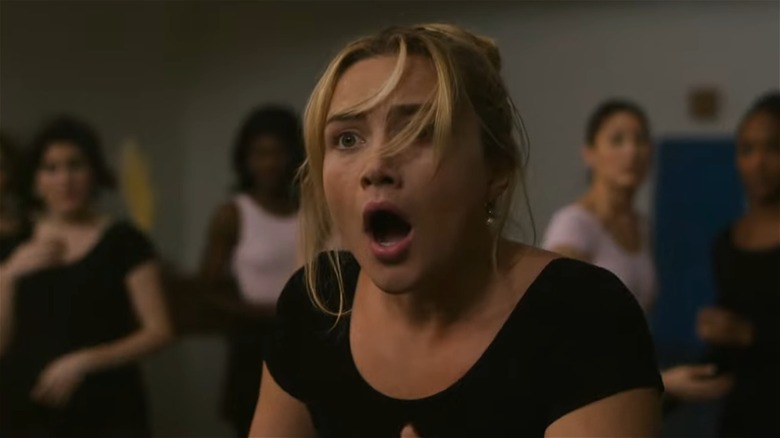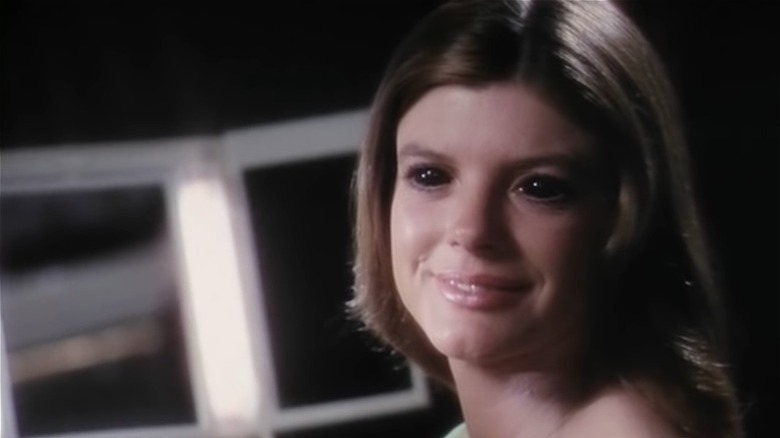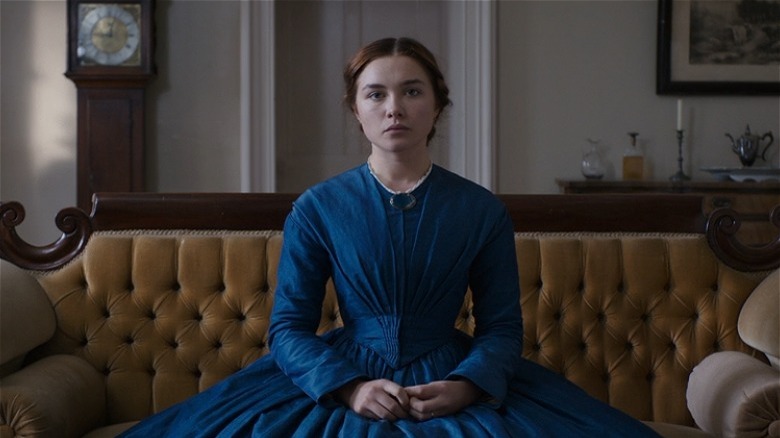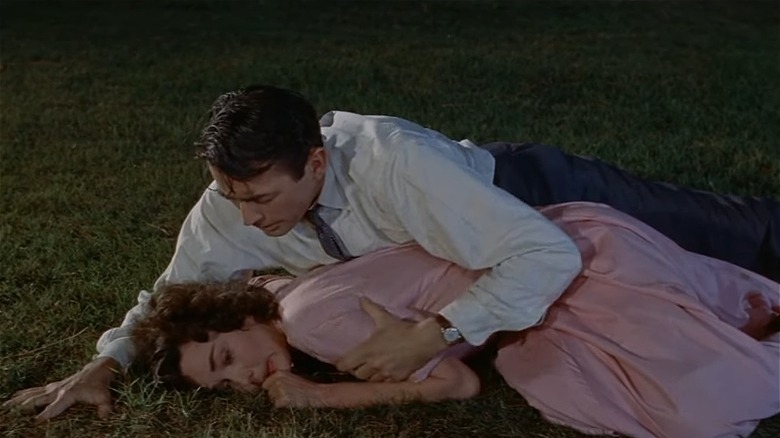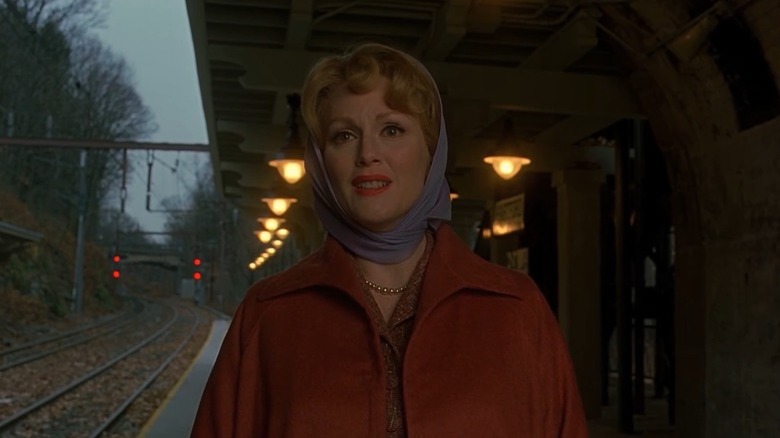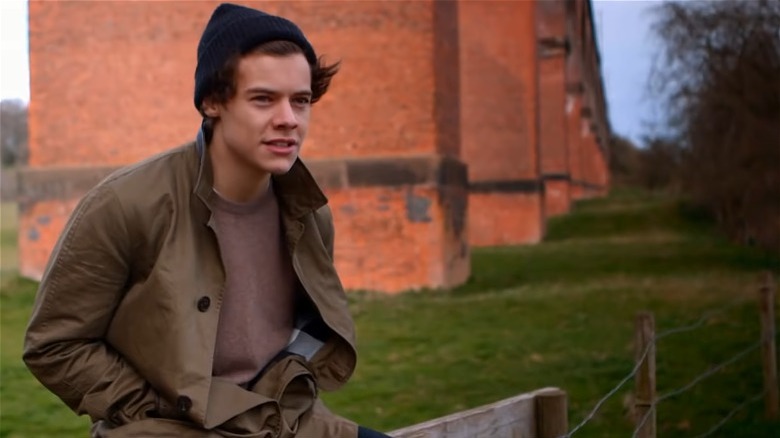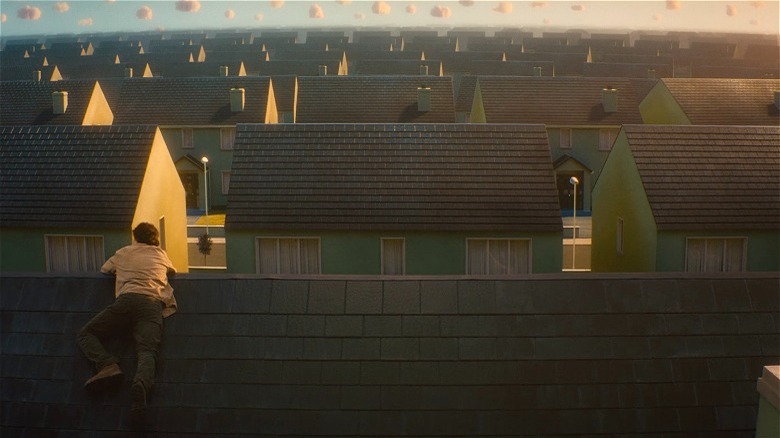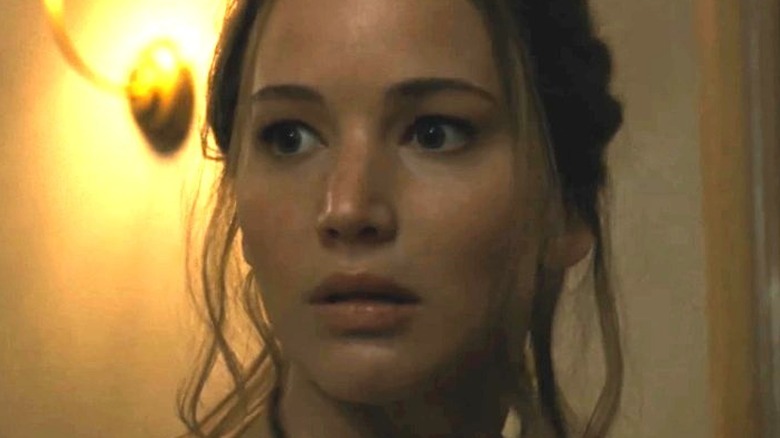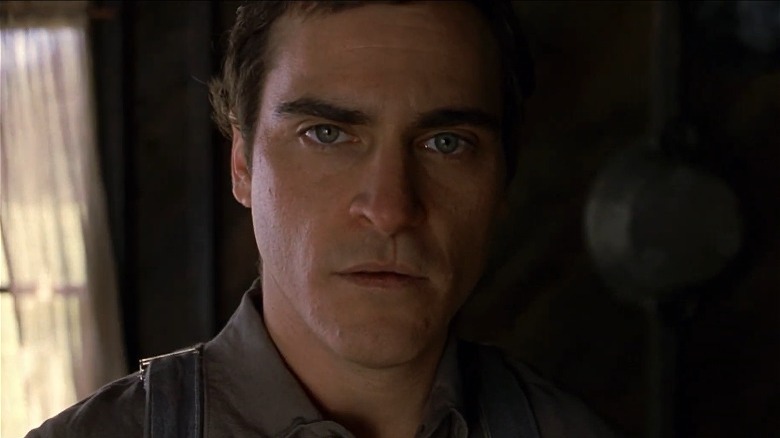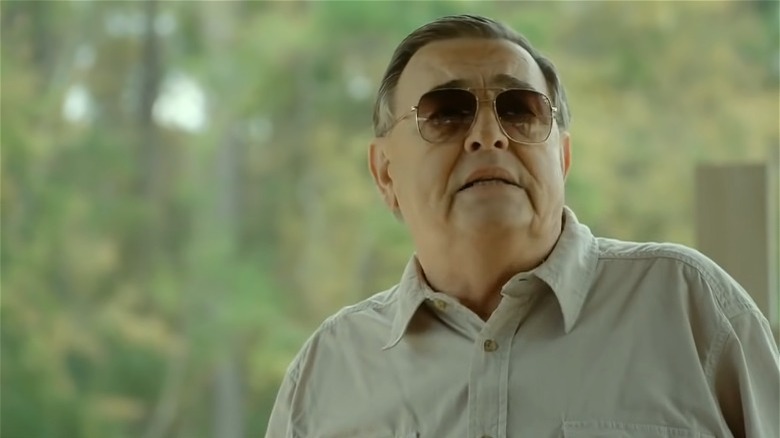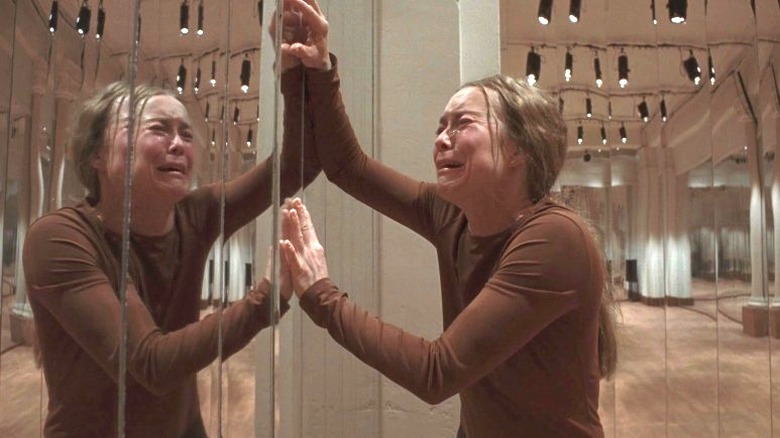10 Movies That Don't Worry Darling Fans Should Watch Next
After months of buildup and frenzied tabloid gossip, Olivia Wilde's sophomore feature, "Don't Worry Darling," hit theaters on September 23, 2022. The movie is about a woman named Alice (Florence Pugh), who comes to suspect that the idyllic community where she lives with her husband Jack (Harry Styles) is anything but. As she attempts to discover what is going on at the Victory Project's mysterious headquarters, she finds her sanity slipping as everyone around her says she's imagining things.
The film is a pastiche of sorts that seems almost as if the filmmakers took a bunch of other movies, put them in a blender, and splashed the results across celluloid. Wilde herself said at Cinemacon that the film was inspired by "The Matrix," "Inception," and "The Truman Show" — all films that play with the audience's understanding of what is real and what's imaginary. However, If you've seen "Don't Worry Darling" and those three wildly-popular touchstones, you might be looking for other movies to pair the new thriller with. Don't worry and read on for 10 movies that will go well with Wilde's new film. Some suggestions are connected thematically, some through direct inspiration, and others because they share cast members. Regardless, these are solid films that are well worth your time.
The Stepford Wives (1975)
Just as "Don't Worry Darling" contains a feminist message in reaction to the "incel" movement, "The Stepford Wives" is a horror movie in response to what its main character Joanna (Katharine Ross) calls "women's lib." (The 2004 remake starring Nicole Kidman isn't great, but that one played on Bush-era fears around the return of "family values"). When the original "Stepford Wives" was made in the 1970s, men were worried women were becoming too self-empowered, too sexually free, and too willing to push back against the patriarchal system that had kept them oppressed for — well, all of history. Joanna begins to suspect that the husbands of Stepford have managed to create a nefarious men's society that somehow forces women back into submission, making them eager and happy to spend their days cleaning house and cooking. It's not unlike the Victory Project in "Don't Worry Darling."
Like Alice in "Don't Worry Darling," Joanna bristles at the idea that she should be happy to simply be a housewife, to give up her creative pursuits and live only for her husband. She is frightened by the strange, stilted social events she is made to attend, and the movie is shot through with a sense of deep unease at how artificial the picture-perfect families around her seem to be. "The Stepford Wives" is a clear influence on "Don't Worry Darling," and watching it can help highlight some of the longstanding themes Olivia Wilde's new film plays around with.
Lady Macbeth (2017)
If you were bowled over by Florence Pugh's performance in "Don't Worry Darling" (and how could you not be?), you're going to want to check out "Lady Macbeth." The 2017 film was one of Pugh's first starring roles, and as in "Don't Worry Darling," she plays a character crumbling under the societal expectations of what it means to be a wife and a woman. In this case, she's the wife of a nobleman who is absent from his estate for long periods, leaving her character lonely and with nothing to do except wear elaborate dresses and sit around staring into space — and torture her servants. She also strikes up a sadomasochistic affair with Sebastian (Cosmo Jarvis), a man who works in the fields. Soon everything spirals into a sadistic power play, made utterly riveting by Pugh's powerhouse performance.
The character could be an alternate-universe version of Alice, who also finds herself desperately unhappy when she realizes that she has married into a situation where she is expected to do little more than cook and clean for her husband, who doesn't think she should concern herself with the specifics of his job.
The Man in the Gray Flannel Suit (1956)
"Don't Worry Darling's" Victory Project is designed to look like the film takes place in the 1950s, a time that exists in the pop cultural memory as a "Leave It To Beaver" age of happy nuclear families and gleeful consumerism. That wasn't realistic. Instead, people were still reeling from the horrors of WWII, and while societal pressure to pretend that everything was fine was immense, many people were secretly miserable. These are the themes at work in "The Man in the Gray Flannel Suit," which is sort of like "Don't Worry Darling" if it was about the Harry Styles character or at least, who the Harry Styles character is pretending to be.
Gregory Peck stars as Tom Rath, a man who gets dressed up every day in the titular suit — the uniform of the age — to dutifully go off to work. He has a wife and three kids at home, as he's supposed to, but he's also suffering from PTSD induced by the things he did and saw during the war. He feels stifled by the corporate conformity of the time, by every polite alcohol-soaked lunch meeting. Peck is great, but so is Jennifer Jones, who plays his long-suffering wife. Her performance is all controlled anxiety in early scenes, and when she finally explodes in the film's final act, she's extraordinary. Like "Don't Worry Darling," there's a climactic, cathartic car ride, and it's hard not to root for her most of all.
Far From Heaven (2002)
One of the best things about "Don't Worry Darling" is Florence Pugh's incredible live-wire performance. As Alice, she gives viewers a peek into the stifling expectations of traditional womanhood, allowing us to witness what happens when a woman is pushed to the brink by her husband's secrecy. It's a layered, controlled performance that is as much about Pugh's stillness and repression as it is about her howls of anguish. At times it's reminiscent of Julianne Moore's work in "Far From Heaven," another film set in the 1950s about a woman struggling to fit into the box predetermined for her by society.
Moore plays Cathy, a housewife who is more progressive than the conservative women who inhabit her town. She strikes up a flirtatious friendship with Raymond (Dennis Haysbert), her Black gardener, even though it gets the other women gossiping. When she realizes that her husband (Dennis Quaid) has been keeping an important secret, she comes apart at the seams. Like Pugh, Moore's performance is as much about what she holds back as what she allows herself to express, and watching that constant battle play out across Moore's face is a real treat.
One Direction: This Is Us (2013)
If you went to see "Don't Worry Darling" because of Harry Styles' involvement or if you were baffled by the hype around his appearance in the film, you may want to pair Olivia Wilde's new thriller with "Supersize Me" director Morgan Spurlock's 2013 film, "One Direction: This Is Us." The hybrid concert film and documentary introduces audiences to the five boys who made up the now-iconic boy band and features footage of the guys goofing off backstage as well as heartfelt interviews as they explore what it feels like to suddenly become famous.
The doc especially provides insight into Styles, who returns to his hometown in England and works a shift at the old bakery where he used to spend his pre-fame days. It's easy to see that even then, he would be the biggest breakout of the band, and watching "One Direction: This Is Us" now makes it easy to see why his solo career has reached even bigger heights. As the affable singer makes his big push into acting, it's interesting to return to the beginning to see just how far he's come.
Vivarium (2020)
In "Vivarium," young couple Tom (Jesse Eisenberg) and Gemma (Imogen Poots) are intrigued by the real estate options afforded by a new pre-planned suburban community, not unlike the Victory Project in "Don't Worry Darling." The houses are identical, the lawns are perfectly manicured, and the sky is always blue. When they go on a tour of one house, their real estate agent vanishes. They soon realize they are unable to leave. Any one of the neighborhood's streets leads them right back to the same house. Food shows up on the doorstep — so does a baby for them to raise.
"Vivarium" forces its characters into a compulsory nuclear family, its frightening machinations keeping its characters trapped in a world where they have no choice but to comply with its oppressive systems. While the sameness of pre-planned communities like this is meant to be a feature, not a bug, in "Vivarium," as in "Don't Worry Darling," the idea of everyone being forced into identical lifestyles becomes horrifying.
mother! (2017)
For the more introverted among us, the loud, claustrophobic, cacophonous social events in "Don't Worry Darling" are some of the tensest and most upsetting parts of the film. Alice finds herself wholly unable to cope with the required social niceties of the parties she is forced to attend. Everyone seems to be talking over each other, the music is just too loud, and no one seems to be listening to her protests.
If you're looking for another movie with similar vibes, you can't do better than "mother!" Darren Aronofsky's masterpiece about a woman (Jennifer Lawrence) who finds her home overrun with party guests she can't get rid of. The film spins out of control as the woman's panic grows, the party devolving into a horrific bacchanalia of broken social norms, overwhelming noise, and writhing bodies. The closeups of Florence Pugh's increasingly desperate face are some of the best aspects of "Don't Worry Darling," and in "mother!" Lawrence's performance is presented almost entirely in closeup, allowing us to read her utter, naked horror in every widening of her eyes and tightening of her lips. "mother!" shares a cinematographer with "Don't Worry Darling," and Matthew Libatique explained to /Film that the closeup is one of his favorite ways to convey anxiety. If you can stomach the movie's unrelenting racket and disquieting closeups, "mother!" pairs perfectly with "Don't Worry Darling."
The Village (2004)
We learn early in "Don't Worry Darling" that the Victory Project is an intentionally planned town far away from civilization, a supposedly-safe bubble where people can live happy lives away from the pressures of regular society. It's a concept that's reminiscent of "The Village," M. Night Shyamalan's film about an isolated community in the woods where people are kept in line by a very clear boundary they are not permitted to cross. Also like "Don't Worry Darling," the residents of "The Village" are forced into compliance through fear of red-clad beings that prowl the area, striking fear into the hearts of the characters through their relentless policing.
As in "Don't Worry Darling," the lead character in "The Village" is a young woman. In this case, she's named Ivy (Bryce Dallas Howard). Though Ivy is initially happy going along with the society she has grown up in, she begins to suspect that she is not being told the truth and that perhaps the rules are not meant to keep her safe as much as they are intended to keep her compliant. Perhaps, as Alice says in "Don't Worry Darling," it's all about control. Ivy's journey to discover where, exactly, she lives will resonate with fans of Alice's similar quest in "Don't Worry Darling."
The Sacrament (2013)
Chris Pine's character, Frank, in "Don't Worry Darling" is a figurehead of the Victory Project, a charismatic man who everyone looks up to as a leader. Director Olivia Wilde told Interview Magazine that the role was inspired by Jordan Peterson, who she called "this insane man ... this pseudo-intellectual hero to the incel community." Frank is basically a cult leader, able to whip his followers up into a frenzy through word-salad orations that make everyone feel good, while in reality imposing strict controls on the way they think and behave.
A great cult film to watch after "Don't Worry Darling" is "The Sacrament" directed by Ti West, whose film "Pearl" is playing in theaters opposite Wilde's thriller. "The Sacrament" is a found-footage horror film that takes the form of a VICE documentary. It follows a group of journalists who travel to a remote village because they are interested in the society that has sprung up there. The cooperative was founded by a charismatic leader known as Father (Gene Jones). The sister of one of the journalists is a follower of this man who seems to have brainwashed everyone into giving up their lives and freedom for his cause. The cult in "The Sacrament" is a bit more religious than the Victory Project in "Don't Worry Darling," but both films are getting at similar ideas of what can happen when people fall under the spell of a man who is interested most of all in control.
Suspiria (2018)
Dance plays a significant role in "Don't Worry Darling." Alice attends dance classes taught by Shelley (Gemma Chan), the wife of the Victory Project's leader. Ultimately, dance turns out to be a way to brainwash everyone into "moving as one," and Alice experiences terrifying hallucinations while trying to contort her body as she's instructed. Wilde told Interview Magazine that she was fascinated by the work of director Busby Berkeley, whose precise choreography informs the film. Berkeley, Wilde says, was interested in "complete uniformity, homogeny, women as one mechanism working together, predictable and completely without individual power. He turned them into machines."
If the intense, frightening dance sequences in "Don't Worry Darling" stood out to you — especially the film's use of mirrors — you may want to check out Luca Guadagnino's remake of "Suspiria." The film is about a young woman named Susie (Dakota Johnson) who attends a dance school in Cold War-era Germany, and she learns that not all is as it seems. The dancers at the school are being taught strange, complex movements that may have something to do with the disappearances of several students, and rumors of witchcraft abound. The dance scenes are deeply unsettling and, at times, very hard to watch because they're so odd, making "Suspiria" a perfect film to watch after having seen "Don't Worry Darling."
